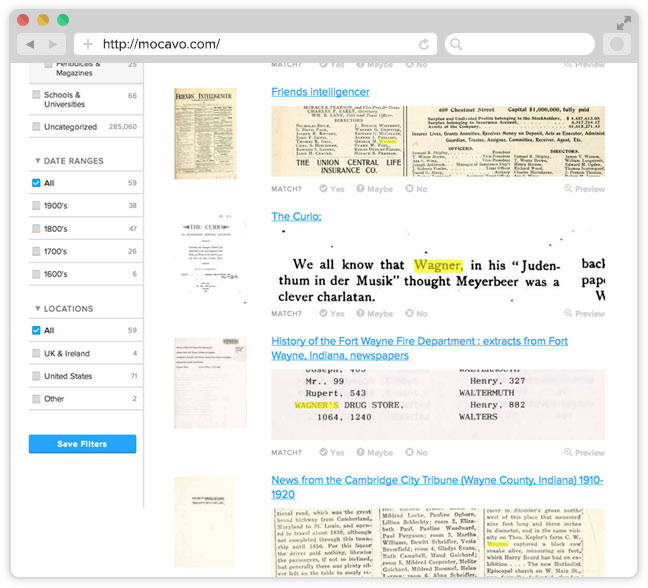 Earlier today I noticed something troubling on Mocavo.com, a genealogy search engine recently purchased by FindMyPast.com. When you click “Search,” the second link in their navigation, you get to a critical marketing page (left) with screenshots showing how their search engine works. The portion of the page outlined in red is reproduced below exactly as it I downloaded it from their site.
Earlier today I noticed something troubling on Mocavo.com, a genealogy search engine recently purchased by FindMyPast.com. When you click “Search,” the second link in their navigation, you get to a critical marketing page (left) with screenshots showing how their search engine works. The portion of the page outlined in red is reproduced below exactly as it I downloaded it from their site.
Notice the second listing, which reads, “We all know that Wagner, in his ‘Judenthum in der Musik’ thought Meyerbeer was a clever charlatan”:

Reading this quote, you might think little of it. Who are these people? Blah blah German I can’t read. And, oh, how quaint that one dead guy called another a clever charlatan!
Would you be surprised to learn that this sample search result references one of the most important and well-known examples of German anti-Semitism leading up to the Nazi period?
- This Wagner is Richard Wagner, a famous opera composer (you probably know his “Ride of the Valkyries”), who was also a notorious anti-Semite. After his death, his music and ideas inspired the Nazis.
- Meyerbeer is Giacomo Meyerbeer, a Jewish opera composer whose works were wildly popular in their time, but largely forgotten today. Meyerbeer was an early mentor of Wagner’s, supporting him both musically and financially, but Wagner later turned on him, launching anti-Semitic attacks that were so accepted that Meyerbeer’s music stopped being performed.
- Das Judentum in der Musik (Jewishness in Music) is a hateful essay Wagner wrote, attacking Jews in general and Meyerbeer in particular. It is a seminal work of German anti-Semitism, containing statements that some consider to recommend annihilating the Jews.
All of this information is well-known to historians of this period, as well as musicologists. The quote in the Mocavo image — “[This leading anti-Semite] in his [notoriously anti-Semitic essay] thought [a once-famous Jewish man whose reputation he destroyed] was a clever charlatan” — is factual; it repeats one of the milder criticisms Wagner lodged against Meyerbeer. But now that you know its context — who these people were, the historical and cultural background to this insult, and most importantly, the legacy of this enmity — you see that the casual reference to this nasty bit of history is, well, strange for a cheerful product tour meant to tempt you into a free trial.
I am not saying that Mocavo holds or promotes anti-Semitic beliefs for including this image; repeating that someone once said something doesn’t mean that they agree with it. What I am saying is that Mocavo clearly has no idea what they posted prominently on their site. Otherwise, why would they have knowingly given attention to a statement of hate in an age where we still struggle with that hate? Nor am I saying that Mocavo should remove this article from their database; on the contrary, I am glad they made it easier for everyone to learn about this period. But there’s a time and a place for grappling with unpleasant history, and I‘m sure if they had known what this record meant, they would have organized their sales pitch around anything else from their enormous database other than a casual reference to proto-Nazi sentiments! Having worked for Internet companies all my adult life, I know how many levels of people are involved in creating, approving, launching, and testing important marketing pages like this one. This surprising image means that at many levels of their genealogy company, not a single person was at all curious about what this search result meant.
And that’s the larger lesson for all of us: How often do we, too, miss references to bygone personalities and events? Even when the records provide context for our ancestor’s life, how often do we fail to research the nuances to understand everything that the record is telling us about times gone by? Clues for the circumstances of our ancestors’ experiences are all around us — hiding in plain sight like this Wagner quote — if only we would exercise our own curiosity to pick them out and investigate what they mean.
Update:
Movaco wrote to me to address my concerns.
We have already removed that image and will find a more appropriate example of search results very soon.
Let me also confirm that you are right to assert that Mocavo does not hold or promote anti-Semitic beliefs, and that we would never intentionally give undue attention to such hateful works.
 Follow
Follow
This is a very well-reasoned and well-written post. It clearly explains why the quotation is objectionable as an example of a “random” result of a search engine. I’m also glad that Mocavo responded quickly and appropriately. Thanks for raising this issue!
Thanks, Susan! Appreciate your kind words — and yes, also grateful Mocavo took the feedback seriously.
Hi Tammy,
Thank you very much for catching this on Mocavo and getting it removed. Someone on their team inserted the passage, perhaps not as innocently as you allow, though I accept that their later contributors/reviewers at Mocavo were probably uninformed.
You gave a very intelligently researched and organized presentation to our genealogy society last October 26, and I’m delighted to see the same qualities in your handling of this situation.
Heidi Urich
Thanks for your kind words, Heidi! I enjoyed meeting you in Boston, and I’m touched that you’re keeping up with my blog. 🙂